MaaS (Mobility-as-a-Service) is becoming an increasingly important topic for cities and transport operators. Customers want to get around easily with no friction. This task puts an immense pressure on transport planners who need to reinvent the way people travel while still working with the old infrastructure.
Free: The Logistics Point Magazine Jan2020
Digitisation first
With the growth of smartphone users the way journeys are made is changing. Customers want more information that is not only accurate but relevant to their individual journey. Yovav Meydad, Moovit’s CMO, says this could only be achieved by having a single app that aggregates the information and presents it in a useful format. ‘You need live information for each of the elements along the journey. It is very critical for such information to be stored and aggregated into one multimodal planner in order to create a trip that is valid and works. If it doesn’t take into account live information, those trip suggestions might not be valid,’ says Yovav. (Read the full story on Moovit in the February issue).
Standards for all
Nick Mackie, Head of Global Mobility at VISA, echoes this by adding that standards are an important tool when designing MaaS. ‘Standards bring mobility, consistency and convenience,’ he says. In his opinion cities need to work together to build a framework that can be sustainable so travellers do not have to download a different app for every single step of their journey. (Read more about VISA Mobility plans in March). Unifying payment methods will bring sustainability and will unlock the true potential of MaaS.
‘In a way we are in the infancy of MaaS. There needs to be a level of personalisation beyond what exists today,’ says Kulvider Maingi, Corethree CTO (Read more about Corethree soon). He says people want to move around and they should not be forced to understand how every single transport system works.
Cash or card
For many MaaS companies removing cash is not the answer. They would rather offer multiple options for paying. Making sure that all people access the transport network means having options. ‘Mobility is a basic human right for everyone and it is the backbone for life,’ says Yovav from Moovit. There will be a change in the infrastructure as well. Corethree has launched a system that can be implemented quickly. This will enable companies to provide accessibility on a lower cost without spending millions of equipment.
Sharing revenue
Apart from making the journey easier for customers, many MaaS companies want to bring together different players in the transport sector. This would inevitably lead to sharing more information and also sharing the revenue. According to Thales, a large French company, MaaS will be a new way to share revenue. It is no wonder then why so many are interested in the way MaaS will evolve.
Download The Logistics Point Magazine January 2020 to get the February issue right after publishing!
#MaaS #CoreThree #Moovit #VISA #NickMackie #Thales
